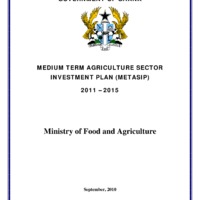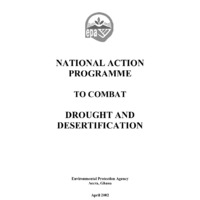Recherche
2 items
Ghana medium term agriculture sector investment plan (metasip)
The Medium Term Agriculture Sector Investment Plan (METASIP) (2011 – 2015) has been developed using a largely participatory process and based on FASDEP II objectives with a target for agriculture sector GDP growth of at least 6& annually and government expenditure allocation of at least 10& of the national budget within the plan period. These targets are in conformity with agricultural performance targets of the country’s National Development Planning Commission (NDPC), the ECOWAP of ECOWAS and the CAADP of NEPAD and are expected to contribute significantly to the achievement of the MDGs of the United Nations Organization. As a sector investment plan, emphasis throughout the Plan has been on concerted consultations and actions by all stakeholders of the sector. The key stakeholders include MOFA, other relevant MDAs, DPs, NGOs, academia, civil society, farmers and other on-farm and off-farm private sector operators, researchers and service providers. Agriculture continues to be the largest sector of Ghana’s economy, contributing about 39& of GDP compared to about 26& for the industry sector and 31& for the services sector. Arable and industrial crop production has increased only marginally over the last 10 years with the only exception being cocoa which increased significantly between 2000 and 2005. Cotton and coffee production declined very significantly in the last decade. While there is little reliable information on the livestock sub-sector, it is known that the country’s meat situation is deficit to the tune of over 95,000 metric tonnes annually. There is similarly a deficit of about 460,000 metric tonnes with respect to fish. The identified basic problems of the agriculture sector include: reliance on rainfed agriculture and low level and relatively inefficient irrigated agriculture; low level of mechanization in production and processing; high post harvest losses as a result of poor post harvest management; low level and ineffective agricultural finance; poor extension services as a result of several institutional and structural inefficiencies; lack of ready markets and processing; low performing breeds of livestock; poor feeding of livestock; high cost of feed for poultry; poor livestock housing and husbandry management; competition from imports and poor post-production management of livestock products; over-fishing of natural waters; undeveloped fish value chain (e.g. inadequate supply systems for fingerlings and feed) and lack of skills in aquaculture. Strategies in the Plan to improve agricultural performance therefore focus on investments to address these constraints and to improve agricultural productivity and enhance market access. The six Programmes of the Plan which correspond to the six FASDEP II objectives have each been presented along development themes termed Components. POCC analysis was applied to the development issues of the themes to derive outputs and activities. It is envisaged that the Plan will be implemented by existing structures in the MDAs and other stakeholder organizations and that the Policy Coordinating and Monitoring Unit of the Office of the President and the NDPC will play key oversight roles during implementation. MOFA will xii facilitate the coordination of partnerships at all levels and play a lead role in the monitoring and evaluation of the Plan
PANLCD Ghana
Desertification has long been recognized as a major environmental hazard with adverse impacts on the livelihoods of people in the affected regions. In many parts of Africa, desertification has contributed to the increasing poverty of the people and the gradual but irreversible degradation of the ecosystem. Ghana has been greatly concerned about the expansion of desert conditions in most parts of the country. She has been working with the global community, international and national organizations in finding a lasting solution to this problem that threatens the livelihoods of many people. In spite of the fact that the preparation of the National Action Programme (NAP) to Combat Drought and Desertification was hampered by inadequate and outmoded data, this document puts together both desktop and field evidence in a coherent way. Evidently the gaps identified in the data sources should spur the country on to improve on data collection. This NAP is intended to highlight the nation’s efforts at achieving sustainable development and re-emphasize the support Ghana requires to fully participate in anti desertification efforts. The preparation of this document has undoubtedly contributed to the creation of awareness about the dangers of desertification in the country. It is hoped that if the necessary resources are mobilized for the implementation of the programmes and activities identified in this document, then the nation would be strengthened and empowered to pursue sustainable development pathways. The implementation of these programmes will ensure good agricultural practices, food security, poverty alleviation and sustainable exploitation of our natural resources and ultimately lead to the achievement of the goals of the Convention on Drought and Desertification.

